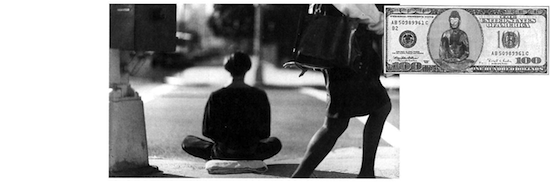
Rise before dawn and bow three times to the Buddha within you. Bow three times to whatever Buddha image you may already have. If you have no Buddha image, trace the outline of a footprint or a circle on the wall and bow to that. Bow three times to anyone else who may be doing this practice at this very moment, to those who have done it in the past, and to those who may yet come to this practice in the future. When you have thus performed your prostrations, fold your blanket into a square and be seated on the floor.
Next, begin the practice of Buddhism on No Dollars a Day. Maintaining awareness of your breathing in as you are breathing in, breathe in. Maintaining awareness of your breathing out as you are breathing out, breathe out. As thoughts arise, make note of them. As physical sensations arise, do the same. From moment to moment, follow only the breath. Do not follow anything other than the breath.
Note carefully when thoughts or impulses arise in regard to purchasing the dharma: the impulse to buy incense or a cushion, to pay membership dues, to purchase dharma teachings in the form of books or tapes or initiations. At the very moment that these thoughts or impulses arise, unbind yourself from them and return to the practice of Buddhism on No Dollars a Day.
At the end of your meditation session, replace the blanket and proceed about your ordinary business, at all times maintaining a firm conviction that the dharma will manifest itself without dollars. Be especially mindful of advertisements for dharma products and of catalogs or stores where such products may be displayed. To enter such an establishment or touch such products, or to gaze longingly upon images of such products, is an impure act requiring confession before another practitioner of Buddhism on No Dollars a Day within a period of one month.
When you have returned from work, and have taken your evening meal, meditate once more on your folded blanket in the prescribed manner. Afterward, reflect on the quality of your behavior throughout the day. Did your acts in any way contribute to the idea that the dharma was for sale? Did you engage in rootless discussions on the merits of teachers who live in faraway places? Did you do or say anything to imply that the dharma was unavailable to yourself or another at the present place and time? Stated more positively, what did you do to encourage yourself and others in the belief that the dharma can manifest itself right here and now without consumption of any kind?
As you retire, in the moments before you fall asleep, reflect on the precepts and the fact that no dollars need be spent to keep them. Reflect on the Four Noble Truths of Buddha and the fact that no dollars need be spent to understand them or to take them to heart.
Once a week, go to your public library and read books on Buddhism (all kinds). Be mindful that these books may or may not have been written by someone who understands and follows the practice of Buddhism on No Dollars a Day. Take that which comes without a price tag and cherish it as a holy text.
Thank you for subscribing to Tricycle! As a nonprofit, we depend on readers like you to keep Buddhist teachings and practices widely available.